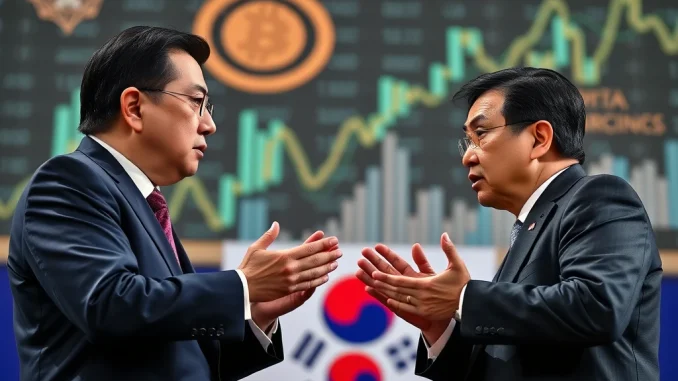
The world of cryptocurrency is increasingly intersecting with mainstream politics, and nowhere is this more evident than in the recent South Korea crypto ETF debate. A significant clash has erupted between leading presidential hopefuls within the conservative People Power Party (PPP), highlighting the complex and sometimes controversial nature of integrating digital assets into traditional finance. This isn’t just a minor disagreement; it’s a crucial moment in the ongoing discussion about crypto regulation in the nation.
A Heated Korean Presidential Debate on Crypto
The tension flared during the second round of the PPP primary debates on April 25th. At the center of the storm were Han Dong-hoon, a prominent presidential primary candidate, and fellow contender Hong Joon-pyo. The point of contention? Hong Joon-pyo’s previously stated support for introducing spot crypto ETF products in South Korea, as detailed in his own book. According to a report by Yonhap Infomax, Han Dong-hoon directly challenged Hong on this stance, demanding clarification on his reasoning.
Hong’s response was perhaps unexpected. He reportedly admitted that he had included the passage endorsing spot crypto ETFs in his book without a complete understanding of the issue at the time. He stated that introducing them simply ‘seemed like a good idea’. This admission during a high-stakes Korean presidential debate immediately sparked further questions and highlighted the nuanced (or perhaps, in this case, underdeveloped) positions some politicians hold on complex financial innovations like crypto ETFs.
What Exactly is a Spot Crypto ETF and Why Does it Matter?
Before diving deeper into the political debate, let’s clarify what a spot crypto ETF is. Unlike futures-based ETFs, which track the price of futures contracts for cryptocurrencies, a spot crypto ETF directly holds the underlying asset, such as Bitcoin or Ethereum. This means the ETF’s price is intended to closely mirror the real-time market price of the cryptocurrency itself.
The introduction of spot crypto ETFs is often seen as a significant step for several reasons:
- Accessibility: They allow traditional investors to gain exposure to cryptocurrencies through regulated brokerage accounts, without needing to navigate crypto exchanges, wallets, or private keys.
- Legitimacy: Approval by financial regulators lends a degree of legitimacy and maturity to the crypto market in the eyes of mainstream finance.
- Institutional Flow: They can open the door for larger institutional investors who may be restricted from holding cryptocurrencies directly but can invest in regulated ETF products.
- Market Impact: Increased demand from ETF inflows can potentially have a positive impact on the price and liquidity of the underlying cryptocurrencies.
Given these potential impacts, a politician endorsing such a product is making a statement about their view on the future of finance and South Korea’s place within it.
The Political Dynamics: Why the Backtrack?
Hong Joon-pyo’s admission of not fully understanding the issue when writing his book raises questions about the depth of research and consideration given to policy positions, especially on emerging and complex topics like crypto. His initial support likely aimed to appeal to younger, tech-savvy voters or position himself as forward-thinking in finance. However, the subsequent backtracking under pressure from Han Dong-hoon suggests several possibilities:
- He genuinely realized the complexities and potential regulatory hurdles involved.
- He was unprepared to defend the position in a debate setting.
- There are significant internal disagreements within the party regarding crypto policy.
- He perceived the stance as politically risky upon closer examination or due to negative feedback.
This public ‘flip-flop’ during a Korean presidential debate could impact voter perception, raising concerns about preparedness or conviction on policy matters.
Implications for Crypto Regulation in South Korea
This high-profile clash over a spot crypto ETF signals that crypto regulation is becoming a significant topic in South Korean politics. As candidates vie for leadership, their stances on digital assets could influence voter decisions, particularly among the growing demographic of crypto investors in the country.
The debate highlights the ongoing tension between fostering financial innovation and ensuring investor protection and market stability. South Korea has historically taken a cautious approach to crypto regulation, implementing strict rules on exchanges and trading. The prospect of approving complex products like spot crypto ETFs brings these regulatory challenges to the forefront.
For the crypto community in South Korea, this political debate is a double-edged sword. On one hand, it shows that cryptocurrencies are being taken seriously at the highest levels of government. On the other hand, the apparent lack of deep understanding or consensus, even among leading figures, suggests that a clear and predictable regulatory framework for products like spot ETFs may still be some way off.
Looking Ahead: What’s Next for South Korea Crypto ETF Prospects?
The path forward for a South Korea crypto ETF remains uncertain. While other countries, like the United States, have recently approved spot Bitcoin ETFs, South Korea’s financial regulators have maintained a cautious stance. This political debate adds another layer of complexity.
Key factors that will influence the future include:
- The outcome of the PPP primary and eventually the presidential election.
- The evolving global regulatory landscape for crypto assets.
- The ability of regulators to establish a clear framework for investor protection and market integrity.
- Continued public and political pressure for greater accessibility to crypto investments.
The exchange between Han Dong-hoon and Hong Joon-pyo underscores that the journey towards clearer crypto regulation and the potential introduction of products like spot ETFs in South Korea will likely be marked by further debate, scrutiny, and evolving political positions.
Summary: The Political Heat is On
The recent Korean presidential debate within the People Power Party vividly illustrates how intertwined cryptocurrency has become with mainstream political discourse in South Korea. The clash over the potential introduction of a South Korea crypto ETF between Han Dong-hoon and Hong Joon-pyo, particularly Hong’s admission of limited understanding, reveals both the growing importance of crypto as a policy issue and the challenges politicians face in grasping its complexities. This moment serves as a powerful reminder that the future of crypto regulation and the accessibility of products like the spot crypto ETF in the country will be heavily influenced by ongoing political debate and evolving stances from those seeking leadership.



